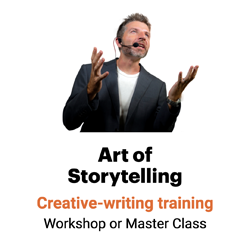Try this literary device in headlines, leads & quotes
Remember Barack Obama’s speeches? Those lyrical lines like:

“Let us resist the temptation to fall back on the same partisanship and pettiness and immaturity that has poisoned our politics for so long.”
And:
“Drive the scourge of slavery from our soil.”
Lovely.
Indeed, alliteration “makes your language lyrical,” wirites Sam Horn, author of POP! Stand Out in Any Crowd.
Alliterative phrases built on a repetition of sounds also draw attention to your message, create rhythm, create mood and make your messages more memorable.
We’re not talking nursery rhymes or tongue twisters, of course. Forget Peter Piper picked a peck of pickled peppers. We don’t even care if you alliterate vowel sounds or consonant sounds.
But do tap the power of alliteration for your headlines, leads and quotes.
1. Alliterate your headlines.
Alliteration makes your headlines more engaging and memorable. That’s the approach Eastman Chemical communicators used when they wrote this headline, summarizing some of the things the company’s R&D department had worked on recently:
Satellites, Soap and Succotash
Copy editor Damen Clow of Scripps Newspapers earned an American Copy Editors Society’s headline contest award for a portfolio that included this alliterative headline:
Shiatsu for your Shih Tzu?
Certified massage therapist’s skills go straight to the dogs in Camarillo
And The New York Times copyeditors produced this alliterative headline and deck:
Tutus and testosterone
Men behaving balletically
2. Alliterate your leads.
Grab attention at the top your story with an alliterative lead, like this one from a Wall Street Journal piece on the trend toward giving stocks as Christmas presents:
Consider stuffing their stockings with stocks.
3. Alliterate your quotes.
Alliteration makes your subject matter expert sound “instantly eloquent,” Horn says.
So write alliterative sound bites, like this one from a Silver Anvil Award-winning press release for Hallmark:
“The stuff of Shoebox is what we experience in our daily lives,” says Kim Newton, product manager. “It’s what turns us on or ticks us off, but it’s what we are all going through together.”
A writer for H&R Block used the same technique for this release quote:
“Any law dealing with an issue as complicated as taxes is bound to have errors, omissions and an ‘oops’ or two,” says Kathy Burlison, EA, tax research and training specialist at H&R Block.
Have a little list? Alliterate that, as this Harvard professor did, in a quote that ended up in a New York Times article about treating Ebola:
“You need the four S’s,” he said. “Staff, stuff, space, systems.”
Alliterate your sound bites, and your subject-matter experts will never come off as boring talking heads.
Don’t over-alliterate.
I love to alliterate. Given time, I’d alliterate my to-do list. That’s why John B. Bremner, a journalism professor at the University of Kansas, once pulled me aside and said — warning me off alliteration while perfectly alliterating himself:
“Ann, a little alliteration goes a long way.”
So keep it to that: a little alliteration.
Next steps
Learn more about alliteration.

Leave a Reply